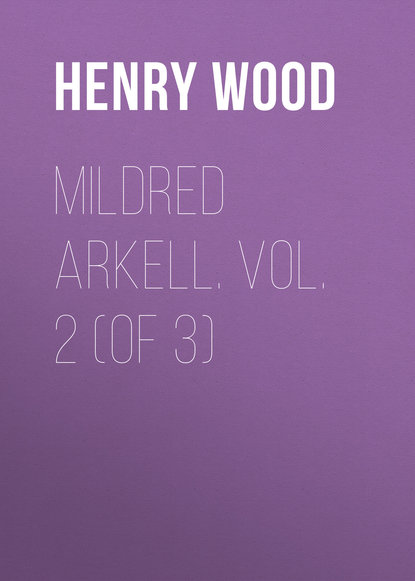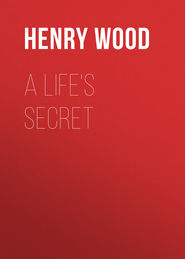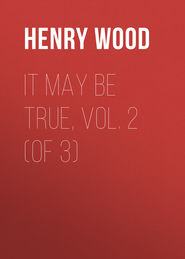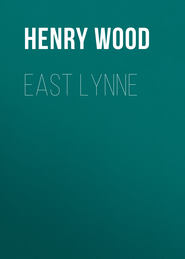По всем вопросам обращайтесь на: info@litportal.ru
(©) 2003-2024.
✖
Mildred Arkell. Vol. 2 (of 3)
Настройки чтения
Размер шрифта
Высота строк
Поля
"Goodness me! you might go now, if that's what you mean; you know enough. Harry, I do hope when you are ordained you'll get some high preferment."
"Such luck is not for me, Miss Beauclerc. I may never get beyond a curacy; or at most a minor canonry."
"Nonsense, and double nonsense! With the influential friends you may count even now! You know that everybody makes much of you. I should like to see you dean of this cathedral."
"And you–" Henry stopped in time. A tempting vision had mentally arisen, and for the moment led him out of himself. Did Georgina scent the treason, all but uttered? She resumed volubly, hastily—
"I have a great mind to tell you something; I think I will. But don't you let it go farther, Henry, for it is a secret as yet. There's going to be a school examination."
"No!" exclaimed Henry, some consternation in his tone.
"Why! are you afraid of it?"
"I am not. But I was thinking how very unfit the school is to stand it. What will Mr. Wilberforce say?"
"There's the fun," cried Georgina in glee. "When I heard papa talking of this, I said it would drive the head master's senses upside down. The dean and chapter are going to introduce all sorts of improvements into the school."
"What can have set them on to it!" exclaimed Henry, unable to recover his surprise and concern.
"The spelling, I think," said Georgina, pursing up her pretty mouth. "Jocelyn—and he'll be the senior boy this next half, you know—wrote a letter to his aunt; she rents her house and land under old Meddler, and knows the Meddlers—visits them, in fact. What should she do but take the letter to old Meddler, and asked him whether it was not a disgrace to any civilized community. Old Meddler kept the letter and brought it here, when he came into residence last week, and showed it to papa. There were not ten words spelt right in it. Altogether, there's going to be something or other done. But I'm sure you need not look so concerned over it, Henry Arkell; you are safe."
"I am safe. Yes, thanks to my father, I have enjoyed great advantages. But I am thinking of the others."
"Serve them right! They are a lazy set. Papa said, 'I should think Henry Arkell does not write like this!' I could have answered that, you know, had I chosen to bring out some of your letters."
There was a pause of silence. The tone had been significant, and his poor heart was beating wildly. "What a lovely rose!" he exclaimed, when the silence had become painful. "I wish I dare pluck it!"
"Dare! Nonsense! Pluck it if you wish."
"I thought it was forbidden to touch the flowers here!"
"So it is," said Georgina, snapping off the rose, one of the variegated species, and a great beauty. "But I do as I please. I would pluck all the flowers in the garden for two pins, just to see the old gardener's dismay."
"What would the visitors say to you?"
"Bow to me, and wish they dare perform such feats. Pshaw! I am the dean's daughter. Here, Harry, I will make you a present of it."
She threw the rose into his hand as she spoke, and she saw what the gift was to him.
"What shall you do with it, Harry?"
"Had I plucked the rose myself, I should have given it to my mother. I shall keep it now—keep it for ever. I may not," he added, lowering his tone, and speaking, as it were, to himself, "part with your gifts."
Georgina laughed lightly, an encouraging laugh.
Oh! it was wrong; wrong of her to act so. They reached the end of the shady walk and turned again.
"How long are you going to remain in that precious choir?" resumed Georgina, "wasting your time for the public benefit."
"Mr. St. John put the very same question to me this morning. He–"
"Mr. St. John!" she interrupted, in startling, nay, wild impulse, and her face became one glow of excitement. "But what do you mean?" she added, subsiding into calmness as recollection returned to her. "He is not in Westerbury."
The words, the emotion, told their own tale; and their true meaning flashed upon his brain. It was an era in the unhappy boy's life. How was it that he had been blind all these years?
"You take a strange interest in him, Miss Beauclerc," and there seemed to be no life left in his pale face, as he turned to her with the question.
"For another's sake," she evasively answered. "I told you some time ago Frederick St. John was in love with her."
He knew to whom she alluded. "Do you think it likely that he is, Miss Beauclerc?"
"If he's not in love with herself, he is in love with her beauty," said Georgina, with a laugh. "But you know what the popular belief is—that the heir of the St. Johns, whatever he may do with his love, may only give his hand to his cousin, Lady Anne."
"I hope it is so. She is the nicest girl, and he deserves a good wife. I used to sing duets with her when she was last at the Palmery."
"Oh!" said Georgina, turning her pretty nose into the air, "and so you fell in love with her."
"No," replied Henry; "my love was not mine to give."
Another pause. Georgina snatched a second flower—a carnation this time—and began pulling it to pieces.
"I suppose you heard from him this morning?"
"Yes."
"And where is he now?"
"In Spain. But he talks of coming home."
He stole a glance at her; at the loving light that shone in her bright blue eyes; at the soft glow, red as the carnation she was despoiling, on her conscious cheek. Why did he not read the signs in all their full meaning? Why did hope struggle with the conviction that would have arisen in his heart?
"Have you his letter?"
"Yes; you can read it if you like. There are no secrets. I have told him that Miss Beauclerc was fond of looking at his letters. He is enthusiastic, as usual, on the subject of pictures."
She closed her hand upon the foreign-looking letter which he took from his jacket pocket to give to her. "I will take it home with me, and return it to you to-morrow; I can't read it now. And, Harry, I am going back to my party, or perhaps they'll be setting the crier to work. Mind you don't breathe a word of that school examination: it would not do. But I tell things to you that I'd not tell to anybody else in the world."
She ran away up a side path, and Henry made his way to the more frequented part of the garden. It happened that he found himself again with the bishop; and the prelate laid his hand, as before, on the shoulder of the handsome boy, and kept him at his side.
Mrs. Peter Arkell had not grown better with years; on the contrary, the weakness in the back was greater, and her health in other ways began to fail. A residence of some weeks at the sea-side was deemed essential for her; absolutely necessary, said her medical attendant, Mr. Lane: and indeed it was not much less necessary for Peter Arkell himself, who was always ill now. His state of health told heavily upon them. He had been obliged to give up a great portion of his teaching; and but for his ever-ready friend and relative, Mr. Arkell, whose hand was always open, and for certain five-pound notes that came sometimes in Mildred's letters, Peter had not the remotest idea how he should have got along. This going to the sea-side would have been quite out of the question, but that they had met with a fortunate chance of letting their house for two months, to a family desirous of coming to Westerbury. Lucy, of course, would go with them; but the question was—what was to be done with Henry? Travice Arkell, in his impulsive good nature, said he must stop with them, and Mr. Arkell confirmed it. Henry supposed he must, but he felt sure it would not be palatable to Mrs. Arkell.
Travice Arkell was in partnership with his father now. At the time of his leaving school there had been a visible improvement in the prospects of the manufacturers, and Mr. Arkell yielded to his son's wish to join him, and hoped that the good times were coming back again. But the improvement had not lasted long; and Mr. Arkell was wont to say that Travice had cast in his lot with a sinking ship. The designation of the firm had never been altered; it was still "George Arkell and Son." Times fluctuated very much. Just now again there was a slight improvement; and altogether Mr. Arkell was still upon the balance, to give up business or not to give it up, as he had been for so many years.
Henry walked home from the Bishop's Garden, with the strange emotion displayed by Georgina Beauclerc, at the mention of Mr. St. John, telling upon his memory and his heart. Lucy met him at the door, her sweet face radiant.
"Oh, Henry! such news! News in two ways. I don't know which to tell you first. One part concerns you."
"Tell me that first, then," said he, laughing.
"Such luck is not for me, Miss Beauclerc. I may never get beyond a curacy; or at most a minor canonry."
"Nonsense, and double nonsense! With the influential friends you may count even now! You know that everybody makes much of you. I should like to see you dean of this cathedral."
"And you–" Henry stopped in time. A tempting vision had mentally arisen, and for the moment led him out of himself. Did Georgina scent the treason, all but uttered? She resumed volubly, hastily—
"I have a great mind to tell you something; I think I will. But don't you let it go farther, Henry, for it is a secret as yet. There's going to be a school examination."
"No!" exclaimed Henry, some consternation in his tone.
"Why! are you afraid of it?"
"I am not. But I was thinking how very unfit the school is to stand it. What will Mr. Wilberforce say?"
"There's the fun," cried Georgina in glee. "When I heard papa talking of this, I said it would drive the head master's senses upside down. The dean and chapter are going to introduce all sorts of improvements into the school."
"What can have set them on to it!" exclaimed Henry, unable to recover his surprise and concern.
"The spelling, I think," said Georgina, pursing up her pretty mouth. "Jocelyn—and he'll be the senior boy this next half, you know—wrote a letter to his aunt; she rents her house and land under old Meddler, and knows the Meddlers—visits them, in fact. What should she do but take the letter to old Meddler, and asked him whether it was not a disgrace to any civilized community. Old Meddler kept the letter and brought it here, when he came into residence last week, and showed it to papa. There were not ten words spelt right in it. Altogether, there's going to be something or other done. But I'm sure you need not look so concerned over it, Henry Arkell; you are safe."
"I am safe. Yes, thanks to my father, I have enjoyed great advantages. But I am thinking of the others."
"Serve them right! They are a lazy set. Papa said, 'I should think Henry Arkell does not write like this!' I could have answered that, you know, had I chosen to bring out some of your letters."
There was a pause of silence. The tone had been significant, and his poor heart was beating wildly. "What a lovely rose!" he exclaimed, when the silence had become painful. "I wish I dare pluck it!"
"Dare! Nonsense! Pluck it if you wish."
"I thought it was forbidden to touch the flowers here!"
"So it is," said Georgina, snapping off the rose, one of the variegated species, and a great beauty. "But I do as I please. I would pluck all the flowers in the garden for two pins, just to see the old gardener's dismay."
"What would the visitors say to you?"
"Bow to me, and wish they dare perform such feats. Pshaw! I am the dean's daughter. Here, Harry, I will make you a present of it."
She threw the rose into his hand as she spoke, and she saw what the gift was to him.
"What shall you do with it, Harry?"
"Had I plucked the rose myself, I should have given it to my mother. I shall keep it now—keep it for ever. I may not," he added, lowering his tone, and speaking, as it were, to himself, "part with your gifts."
Georgina laughed lightly, an encouraging laugh.
Oh! it was wrong; wrong of her to act so. They reached the end of the shady walk and turned again.
"How long are you going to remain in that precious choir?" resumed Georgina, "wasting your time for the public benefit."
"Mr. St. John put the very same question to me this morning. He–"
"Mr. St. John!" she interrupted, in startling, nay, wild impulse, and her face became one glow of excitement. "But what do you mean?" she added, subsiding into calmness as recollection returned to her. "He is not in Westerbury."
The words, the emotion, told their own tale; and their true meaning flashed upon his brain. It was an era in the unhappy boy's life. How was it that he had been blind all these years?
"You take a strange interest in him, Miss Beauclerc," and there seemed to be no life left in his pale face, as he turned to her with the question.
"For another's sake," she evasively answered. "I told you some time ago Frederick St. John was in love with her."
He knew to whom she alluded. "Do you think it likely that he is, Miss Beauclerc?"
"If he's not in love with herself, he is in love with her beauty," said Georgina, with a laugh. "But you know what the popular belief is—that the heir of the St. Johns, whatever he may do with his love, may only give his hand to his cousin, Lady Anne."
"I hope it is so. She is the nicest girl, and he deserves a good wife. I used to sing duets with her when she was last at the Palmery."
"Oh!" said Georgina, turning her pretty nose into the air, "and so you fell in love with her."
"No," replied Henry; "my love was not mine to give."
Another pause. Georgina snatched a second flower—a carnation this time—and began pulling it to pieces.
"I suppose you heard from him this morning?"
"Yes."
"And where is he now?"
"In Spain. But he talks of coming home."
He stole a glance at her; at the loving light that shone in her bright blue eyes; at the soft glow, red as the carnation she was despoiling, on her conscious cheek. Why did he not read the signs in all their full meaning? Why did hope struggle with the conviction that would have arisen in his heart?
"Have you his letter?"
"Yes; you can read it if you like. There are no secrets. I have told him that Miss Beauclerc was fond of looking at his letters. He is enthusiastic, as usual, on the subject of pictures."
She closed her hand upon the foreign-looking letter which he took from his jacket pocket to give to her. "I will take it home with me, and return it to you to-morrow; I can't read it now. And, Harry, I am going back to my party, or perhaps they'll be setting the crier to work. Mind you don't breathe a word of that school examination: it would not do. But I tell things to you that I'd not tell to anybody else in the world."
She ran away up a side path, and Henry made his way to the more frequented part of the garden. It happened that he found himself again with the bishop; and the prelate laid his hand, as before, on the shoulder of the handsome boy, and kept him at his side.
Mrs. Peter Arkell had not grown better with years; on the contrary, the weakness in the back was greater, and her health in other ways began to fail. A residence of some weeks at the sea-side was deemed essential for her; absolutely necessary, said her medical attendant, Mr. Lane: and indeed it was not much less necessary for Peter Arkell himself, who was always ill now. His state of health told heavily upon them. He had been obliged to give up a great portion of his teaching; and but for his ever-ready friend and relative, Mr. Arkell, whose hand was always open, and for certain five-pound notes that came sometimes in Mildred's letters, Peter had not the remotest idea how he should have got along. This going to the sea-side would have been quite out of the question, but that they had met with a fortunate chance of letting their house for two months, to a family desirous of coming to Westerbury. Lucy, of course, would go with them; but the question was—what was to be done with Henry? Travice Arkell, in his impulsive good nature, said he must stop with them, and Mr. Arkell confirmed it. Henry supposed he must, but he felt sure it would not be palatable to Mrs. Arkell.
Travice Arkell was in partnership with his father now. At the time of his leaving school there had been a visible improvement in the prospects of the manufacturers, and Mr. Arkell yielded to his son's wish to join him, and hoped that the good times were coming back again. But the improvement had not lasted long; and Mr. Arkell was wont to say that Travice had cast in his lot with a sinking ship. The designation of the firm had never been altered; it was still "George Arkell and Son." Times fluctuated very much. Just now again there was a slight improvement; and altogether Mr. Arkell was still upon the balance, to give up business or not to give it up, as he had been for so many years.
Henry walked home from the Bishop's Garden, with the strange emotion displayed by Georgina Beauclerc, at the mention of Mr. St. John, telling upon his memory and his heart. Lucy met him at the door, her sweet face radiant.
"Oh, Henry! such news! News in two ways. I don't know which to tell you first. One part concerns you."
"Tell me that first, then," said he, laughing.











